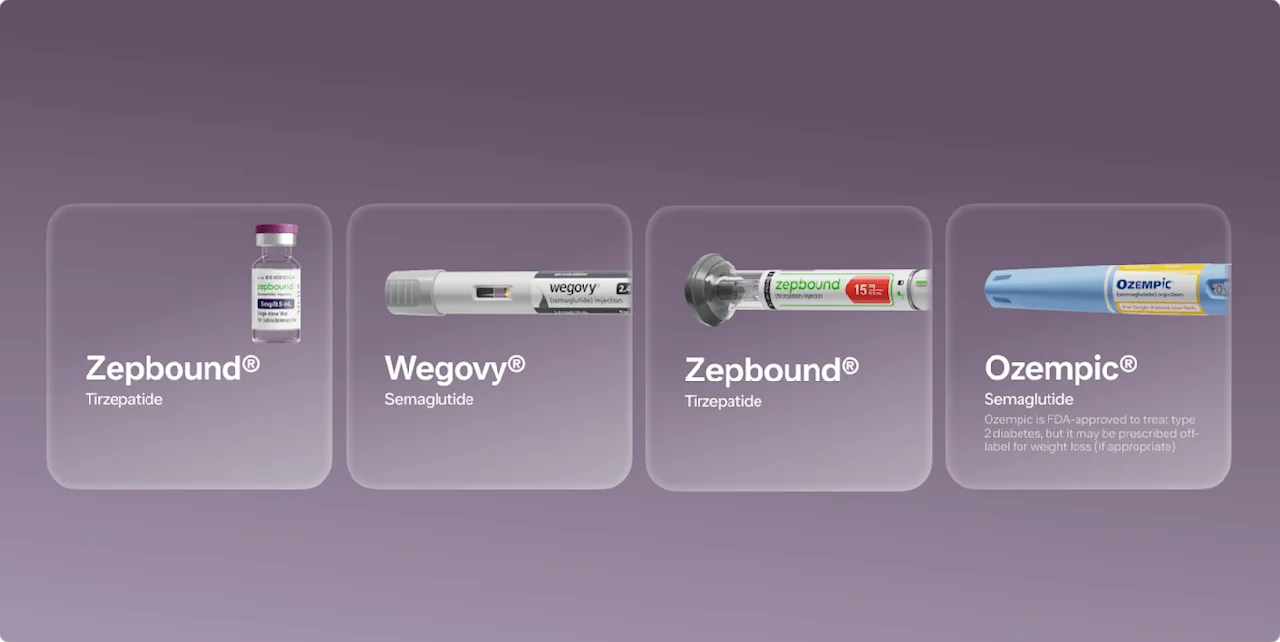Here's what we'll cover
Here's what we'll cover
The promises that proponents of the ketogenic diet make entice many people to try it out. But because the keto diet cuts out nearly all carbs and some food groups—making it a pretty restrictive diet—some people wonder, is keto safe?
What is the keto diet?
The keto diet is a very low carbohydrate and high-fat diet designed to push your metabolism into a state of ketosis.
To reach ketosis (which we’ll define in the next section), most people need to limit their carb intake to fewer than 50 grams per day. Counting macros—fat, protein, and carbohydrates—to limit the total intake of carbs and protein is part of following the keto diet (Masood, 2020).
Recommended foods include high protein and healthy fat intake from foods like:
Meats—poultry, red meats, and fish
Eggs
Low sugar diary
Non-starchy, low-carb vegetables—green leafy vegetables, broccoli, onions, peppers, etc.
Avocados
Healthy oils—olive oil, coconut oil, etc.
Sugary drinks, desserts, whole grains, starchy vegetables, and most fruits are either avoided entirely or limited on the ketogenic diet. These foods are high in carbs, making it challenging to stay in ketosis.
What is ketosis?
When you’re following a low-carb diet, there isn’t enough glucose for energy. Low levels of glucose force your body into ketosis—a process where your body uses fat instead of glucose as its primary energy source. Ketones are one of the byproducts of ketosis. They replace glucose as energy for the brain and central nervous system (Masood, 2020).
Home urine tests are one of the more common ways to monitor for ketones. Blood and urine ketone tests are also available.
When is the keto diet beneficial?
The keto diet has potential benefits for the following conditions:
Epilepsy
The ketogenic diet was first recommended in the 1920s to help manage seizures in epilepsy patients. Now that anti-seizure medications are more effective, the keto diet is usually only recommended for epilepsy patients whose conditions are resistant to medications (Wheless, 2008, Liu, 2018).
Weight management
The ketogenic diet has led to weight loss in some patients who have overweight or obesity. The keto diet increases water loss, helping people see quick weight loss. Although this early weight loss is primarily water weight, some people report that this initial weight loss helps them stick with the diet until they reach their healthy weight goals (Masood, 2020).
Diabetes
People with pre-diabetes and type 2 diabetes may benefit from following a keto diet. Studies show that following a keto diet could help lower blood sugar levels and reduce hemoglobin A1C, your average blood sugar level over the past three months (Batch, 2020).
Heart disease
The research is conflicting on how the keto diet affects heart disease, but some research supports claims that the keto diet helps to (Batch, 2020):
Lower blood pressure
Increase HDL cholesterol (“good” cholesterol)
Lower triglyceride levels
Keto diet risks
Following a keto diet could lead to some negative side effects, such as:
Keto flu
The keto flu is a group of symptoms that appear after starting a ketogenic diet. While it isn’t a disease, the keto flu produces flu-like symptoms in some people as their bodies first transition into ketosis. The symptoms typically begin a few days to a week after starting the diet and can last up to one month.
Here are some of the symptoms of the keto flu:
Headaches and problems concentration
Digestive symptoms like nausea, vomiting, constipation, and diarrhea
Fatigue and muscle soreness
Bad breath
Low blood sugar
People with type 1 diabetes, or those with type 2 diabetes who are taking medications to lower blood sugar, could experience symptoms of hypoglycemia (low blood sugar) (Bolla, 2019). These people are at an increased risk of dangerously low blood sugar levels while following a low carbohydrate diet.
Ketoacidosis
Diabetic ketoacidosis (DKA) is when the level of ketones gets too high in the blood, changing the blood’s pH level. DKA is more common in type 1 diabetics and is a serious condition requiring emergency care. Studies show following a ketogenic diet could increase the risk for diabetic ketoacidosis (Bolla, 2019).
Is keto safe?
For people without serious health conditions, the keto diet can be a safe way to reach their healthy weight goals. For anyone trying to manage a medical condition with diet changes, you should talk with your healthcare provider and a registered dietitian to monitor your progress and health.
The keto diet is not recommended for people with (Masood, 2020):
History of pancreatitis
Liver disease
Gallbladder disease or removal
Kidney disease or kidney stones
Problems metabolizing fat
Short-term health effects of keto
After beginning a keto diet, many people experience some symptoms of the keto flu. The severity and how long symptoms last vary depending on the person.
Once keto flu symptoms clear, many people on the keto diet report increased focus, but the research doesn’t bear this out. Some people may have weight loss, better-controlled blood sugar, and lowered blood pressure (Batch, 2020).
If you have issues with your blood pressure or blood sugar, consult with your healthcare provider before starting the diet to monitor health conditions and medication needs.
Long-term health effects
The research following a keto diet longer than 6–12 months is limited, so there is still a lot unknown about the keto diet’s long-term health effects.
The restrictiveness of the diet has long been reported as a limitation of keto because many people find it difficult to follow long-term. The diet may help with short-term weight loss. Without long-term lifestyle changes, though, research shows dieting attempts often predict future weight gain and obesity (Siahpush, 2015).
Research is conflicting on how the keto diet changes the risk of heart disease. Some research shows the diet improves “good” cholesterol and triglyceride levels, but it also increases “bad” cholesterol. We still don’t understand how the keto diet will affect heart health over time. If you choose to try the keto diet, talk with your healthcare team before starting the diet to see if it is the right fit for your health. They can help you monitor your progress and work with you to develop the best approach for you.
DISCLAIMER
If you have any medical questions or concerns, please talk to your healthcare provider. The articles on Health Guide are underpinned by peer-reviewed research and information drawn from medical societies and governmental agencies. However, they are not a substitute for professional medical advice, diagnosis, or treatment.
Batch, J. T., Lamsal, S. P., Adkins, M., Sultan, S., & Ramirez, M. N. (2020). Advantages and disadvantages of the ketogenic diet: a review article. Cureus, 12(8), e9639. doi: 10.7759/cureus.9639. Retrieved from https://www.ncbi.nlm.nih.gov/pmc/articles/PMC7480775/
Bolla, A. M., Caretto, A., Laurenzi, A., Scavini, M., & Piemonti, L. (2019). Low-carb and ketogenic diets in type 1 and type 2 diabetes. Nutrients, 11(5), 962. doi: 10.3390/nu11050962. Retrieved from https://www.ncbi.nlm.nih.gov/pmc/articles/PMC6566854/
Liu, H., Yang, Y., Wang, Y., Tang, H., Zhang, F., Zhang, Y., & Zhao, Y. (2018). Ketogenic diet for treatment of intractable epilepsy in adults: A meta-analysis of observational studies. Epilepsia open, 3(1), 9–17. doi: 10.1002/epi4.12098. Retrieved from https://pubmed.ncbi.nlm.nih.gov/29588983/
Masood W, Annamaraju P, Uppaluri KR. (2020). Ketogenic diet. StatPearls. Retrieved from https://www.ncbi.nlm.nih.gov/books/NBK499830/
Siahpush, M., Tibbits, M., Shaikh, R. A., Singh, G. K., Sikora Kessler, A., & Huang, T. T. (2015). Dieting increases the likelihood of subsequent obesity and BMI gain: results from a prospective study of an australian national sample. International journal of behavioral medicine, 22(5), 662–671. doi: 10.1007/s12529-015-9463-5. Retrieved from https://pubmed.ncbi.nlm.nih.gov/25608460/
Wheless J. W. (2008). History of the ketogenic diet. Epilepsia, 49 Suppl 8, 3–5. doi: 10.1111/j.1528-1167.2008.01821.x. Retrieved from https://pubmed.ncbi.nlm.nih.gov/19049574/












